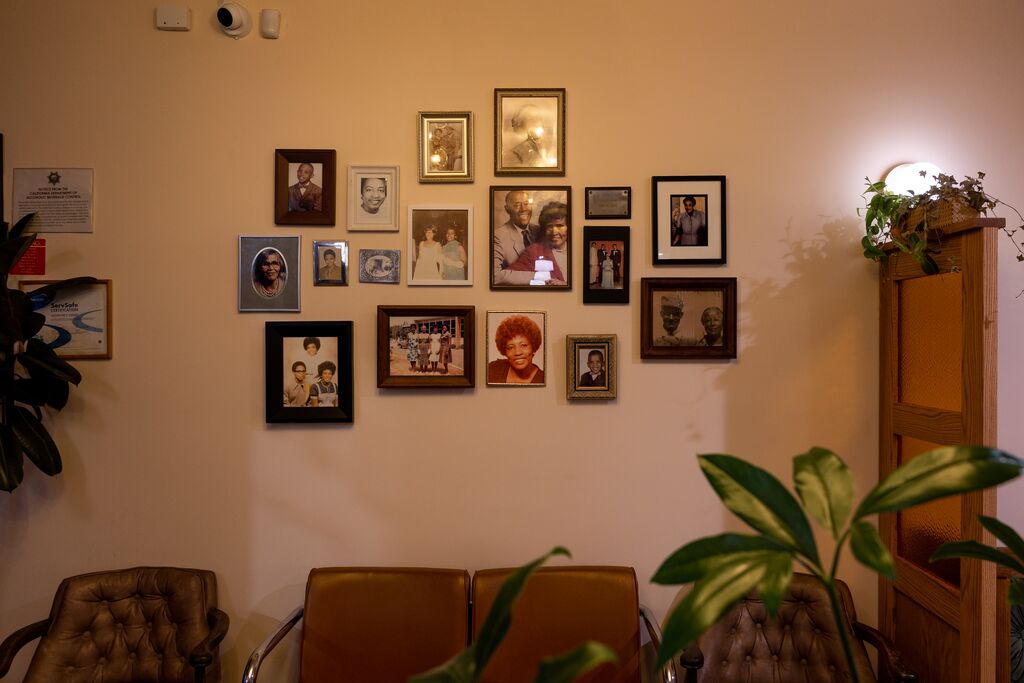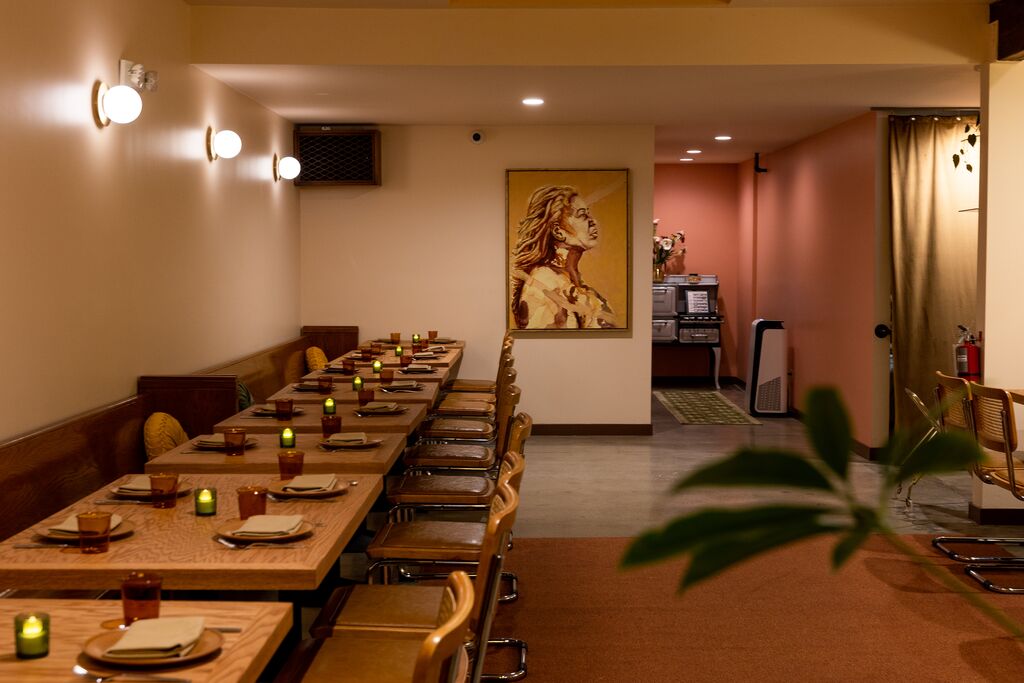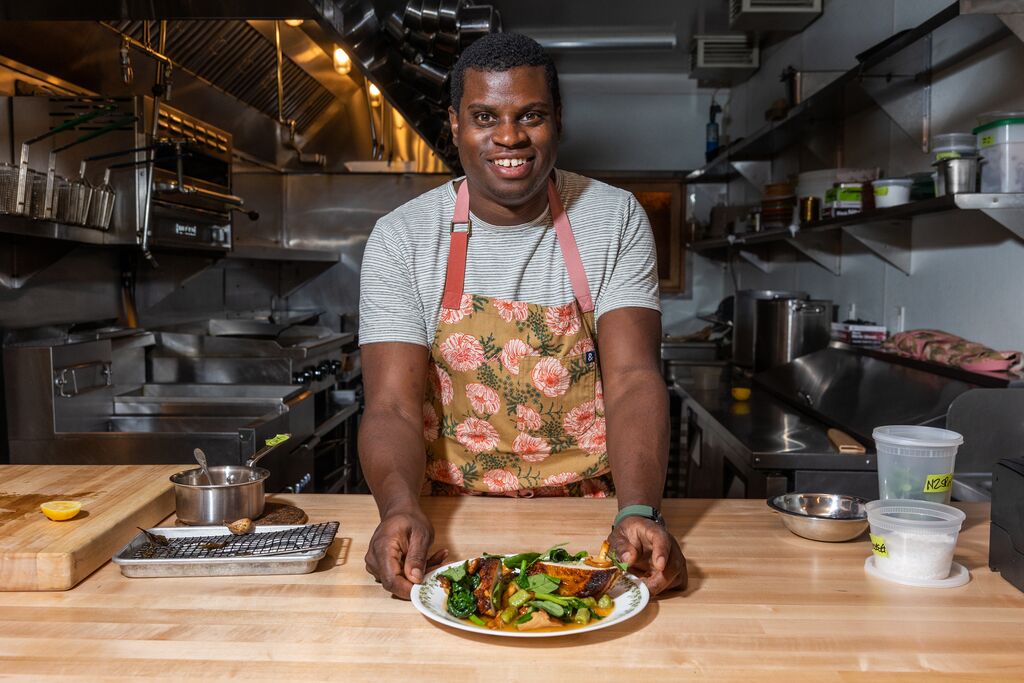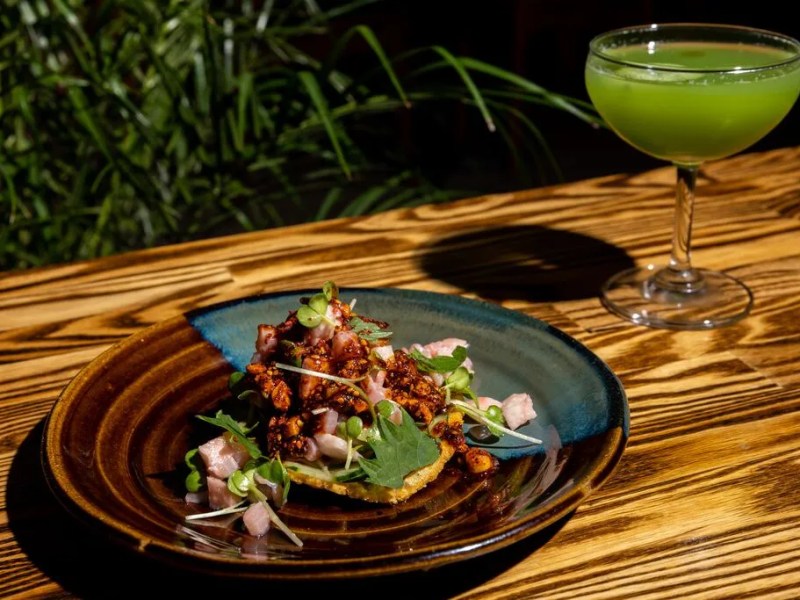Listen up. Geoff Davis speaks softly, but he has a lot to say.
With the September opening of Burdell in Temescal, the chef now has his first permanent platform for sharing his food and philosophy. There, through the faded family portraits, the ’70s color scheme and soundtrack, the seasonally driven soul food, his culinary commentary is unfiltered.
After more than a decade in the industry, Davis has deeply nuanced and strong opinions on how he wants to do things, and Burdell is his mission statement.
“This restaurant has existed in my head for 10 years,” he said.
Davis, 35, poured his experience and training into designing every detail of Burdell. And each element speaks volumes, beginning with the menu. It says: Soul food is not synonymous with Southern food, it is distinct and pulls from several regions and lineages. And, soul food is also worthy of the same recognition and clout as other cuisines more commonly associated with fine dining.
Burdell: Open Wednesday through Sunday 5 p.m. to 9 p.m.; 4640 Telegraph Ave., Oakland; (510)239-9287; burdelloakland.com
“It’s true of a lot of cuisines, like Filipino food, but soul food also gets put in this box. It’s not all fast food and unhealthy, it’s not just fried chicken. It’s really diverse, and it’s the real American cuisine” Davis said. “I was born in Philadelphia. Every Black person has a connection to the south, but it’s not one that should necessarily be celebrated. It’s offensive a little. My family has been in the north for generations, and that’s the food I know.”

Davis’ cooking is rooted in the time he spent as a child visiting his grandfather’s farm in New Jersey and eating fresh, seasonal vegetables with a little meat incorporated into recipes passed down for generations. He grew up in Modesto, and started in the food industry when he was 15, working as a server at a prime rib restaurant. He attended the Culinary Institute of America in New York, and then returned to the Bay Area to work in the kitchens of lauded restaurants like Aqua, Cyrus and The Fifth Floor.
“Tipping has a really nasty history that we just don’t want to continue. It started in the United States as a way to not pay newly freed slaves.”
Geoff Davis
Davis learned a lot—he honed techniques, discovered more about how different ingredients play together and saw how efficient restaurants operate. But he also chafed at the “yes, chef” dogmatism of fine dining, made familiar by red-faced, irate celebrity chefs like Gordon Ramsey and television shows like “The Bear.”
Early in his career, he shied away from his family recipes and cooking soul food because he thought he wouldn’t be taken seriously. At culinary school and in Michelin-starred kitchens, he was often the only Black person in the room.
“It’s hard to cook for people who don’t look like you and don’t appreciate the value you bring,” Davis said. “I wanted to cook for a broader range of people, and more people.”
In 2016 he took a break from restaurant work and spent one year in the wine industry in Napa. He then returned to the kitchen with Commis chef/proprietor James Syhabout on multiple projects, including The Dock, a New American restaurant that was nextdoor to the Linden Street Brewery, before joining the opening team at San Francisco’s True Laurel as executive chef.
“I became more interested in places that had fine-dining tenets but were more approachable,” he said. “I envisioned opening a place where people could come multiple times a week but also celebrate special occasions.”
In 2022 he set out to fully develop his own concept. He held pop-up dinners around the Bay Area to test out the recipes.

As Burdell approached its September opening, Davis looked to create a “warm, welcoming” atmosphere. Logistics manager Zara Fernandez-Aurelio and general manager Omar White, a Chez Panisse alum, helped him craft the workplace culture.
“I think some people are still using 2020 as an excuse to not provide great service,” he said. “I understand they found ways to save money on labor and stuff like that, but for me it’s always been really important. The thing I enjoy about going out to restaurants is service, like even more so than the food. Thinking of some of my favorite restaurants, the food sometimes is not even the star of the show, it’s being in the room.”
Building the atmosphere starts with the staff, from the hosts and servers to the line cooks and managers.
“We’re not going to terrorize the staff,” he said. “One of the big parts of our training was, perfection is not the goal, it’s how you recover from mistakes because you’re going to make mistakes, and no one is going to get screamed at or berated for making a mistake.”
Davis also instituted a 20% service charge in lieu of tipping.
“We use the service charge to pay a really consistent wage, and I just think that tipping has a really nasty history that we just don’t want to continue,” he said. “Tipping in the United States started as a way to not pay newly freed slaves … It started with the railroad system in the 1880s … It spread into restaurants and hotels next, where there were a lot of Black people working that they didn’t view as skilled workers who should be paid a wage. So, it’s basically a continuation of slavery.”
Nods to his family are easy to spot at the restaurant. Burdell is the name of his maternal grandmother. A collection of family photos and memorabilia hangs on the wall to the left of the front entrance, and the plates on the tables are Corelle patterns like Spring Blossom and Woodland Brown, vintage dishware that reminded him of meals with his grandparents.
“Thinking of some of my favorite restaurants, the food sometimes is not even the star of the show, it’s being in the room.”
Geoff Davis
Davis also chose the vermillion-colored, pie slice-shaped tile that lines the wall behind the bar, and the ’70s and ’80s-era stereo equipment that he says, “just sounds better.”
As part of Nosh’s “Gotta Try It” series, we asked Davis to choose one dish from his menu that best reflects his philosophy and concept for the menu.

Roasted Pastured Chicken
“It is a refined version of a really typical dish that families make at home, but it doesn’t lose the spirit of the comfort and robustness of it,” Davis said about his take on chicken and dumplings. “I use some techniques I’ve picked up along the way, but it doesn’t become unrecognizable. It plays in both lanes. So it’s a great dish to show off that we do use a lot of technique, but it’s not ego-driven.”
His roasted pastured chicken is served with spinach dumplings, yellowfoot mushrooms, lemon and chicken drippings. Davis French cuts the chicken breast, a preperation in which the breasts are skin-on and boneless, except the wing drumette is still attached which makes it easy to turn and handle while cooking. The trimmed meat from the wing is is mixed with spinach, lemon and egg and then stuffing the breast with the mixture.
The chicken breast with the skin intact is then sauteed in a pan with chicken fat and butter and seasoned with thyme, garlic and bay leaves. Davis uses a spoon and sharp, rhythmic flicks of the wrist to continuously bathe the chicken in the fat and butter. The breast is then finished in the oven.
The spinach dumplings are made by starting with a choux pastry base and adding spinach puree. He then pipes the mixture into cool water to form the dumplings.
For the sauce, he heats the dumplings, mushrooms and spinach leaves in a pan with lemon, chicken fat and vegetable stock.
“A big part of my style and this restaurant is stripping down garnishes and extra BS,” he said. “This dish is about spinach and mushrooms and chicken and dumplings and how all those things play together. But there’s no extra stuff that doesn’t need to be there, and it’s all recognizable.”
It is a finely tuned dish. The chicken skin is crispy, the ingredients accentuate each other without becoming muddled, and just the right amount of lemon brings a brightness that lifts the entire dish. This is a chorus of ingredients in harmony.




Clockwise from top left: Davis sautees the French-cut, stuffed chicken breast in butter and chicken fat; the sauce is made with lemon, chicken fat and vegetable stock; the dumplings, mushrooms and spinach leaves are cooked in the sauce and then added to the chicken; a final dash of lemon juice is added. Credit: Amir Aziz
Other popular dishes at Burdell include the BBQ shrimp made with Worcestershire sauce, brown butter with lemon and housemade fermented hot sauce, and Davis’ take on chicken and waffles, chicken liver mousse with crispy chicken skin and shallots, maple vinaigrette and a cornmeal waffle. Another hit has been Davis’ greens, slow cooked with ham hock and cider vinegar, and seasoned with berbere from Oakland’s Brundo Spice Company.
“It’s been such a long process, when we finally opened in September I think my primary emotion was almost relief,” Davis said. “We were originally supposed to open in May but there were some delays … We didn’t do it with a blank checkbook, so it’s not perfect, but it’s mine.”




